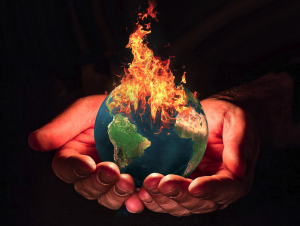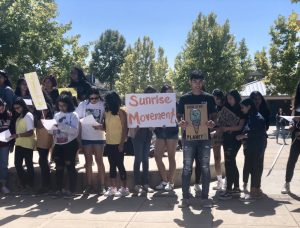Climate change among the final generations
Generational gaps can affect how we tackle climate change as younger generations are left with the responsibility of the climate crisis.
January 11, 2022
“It’s up to your generation to ensure a brighter future for our world!”
When I was younger and teachers said anything along those lines to the class, I felt a sense of pride and encouragement. After all, who wouldn’t want to be a part of a generation that could create a better future and bring a positive effect to major issues like climate change? As I’ve gotten older, the charm from those statements has faded away only to be replaced by pressure and anger. As much as I want to contribute to seeing a change made, I can’t help but feel bitter. Why should I work towards making a difference if older generations aren’t going to do their role? Climate change is not an issue that should be left up to one generation. It’s going to need a lot more people in order to make an impactful difference.
The generational gap exaggerates itself if you look at how people react in our current state. Evidence from Pew Research Center portraying how generations address climate change on and offline demonstrates the gap between how generations respond to climate change and shows the separation between Gen Z and Millennials when compared to Gen X and Boomers. Younger generations have shown an increase in climate action, while older generations are more removed from content relating to it. When asked if they believed “climate should be a top priority to ensure a sustainable planet for future generations”, 67% of Gen Z agreed. The lowest percentage at only 57% of Boomers or older generations agreed, while the highest percentage was among Millenials at 71%. Results varied among similar questions, but results among Gen Z and Millenials always remained the highest in percentage. Of course, social media doesn’t represent generations as a whole, but it certainly raises a point in how news and awareness is spread today as well as who engages with it.
With Gen Z and Millennials being younger generations (with part of Gen Z not yet legal adults), people of older generations are the ones who are in power and are given opportunities to enforce positive change. But when it comes to our climate, they don’t take these opportunities and only further the problem of climate change. In a recent article from the Center of American Progress, it was shown that as of March 30, 2021 there were “139 elected officials in the 117th Congress, including 109 representatives and 30 senators, who refuse to acknowledge the scientific evidence of human-caused climate change.”
Awareness towards climate change has spread through social media and encouraged education and action including this current issue, but it can be argued that other than spreading awareness (and inadvertently fear-mongering), younger generations are not much else than performative. I agree that social media plays a large role in spreading both awareness and misinformation regarding climate change, but that doesn’t mean it has proven itself unhelpful entirely.
Younger generations offer a lot to climate change movements through protesting and making choices in their everyday lives through movements like sustainability and environmentally conscious eating that have become widely popular in recent years. Despite this effort being made, there has been little change in how climate change has progressed. We can’t only rely on singular people and their lifestyles to create a monumental change. We need to see change within a larger perspective. One of the biggest changes that needs to be made involves the reduction of carbon emissions and increase in renewable energy. In 2017, it was shown by the CDP’s Carbon Majors Report that 100 companies were the source of 71% of greenhouse gas emissions. This can be changed by companies committing to renewable energy, which is naturally replenished through natural sources.
A lot has happened since 2017, just as the COVID-19 pandemic of 2020 had an effect on all other aspects of life, it also affected global emissions. There was a drop in emissions from gas, coal, and oil leading to an overall decline by 3.3% in emissions according to the article “Global Energy Review: CO2 Emissions in 2020” from the International Energy Agency.
We can’t leave the responsibility of climate change to a generation where many aren’t old enough to be in situations that could help create change (in gov. positions, able to vote, etc). All generations offer a unique perspective to an issue that has existed longer than most of us have been alive; it’s not up to one specific group to solve it.





